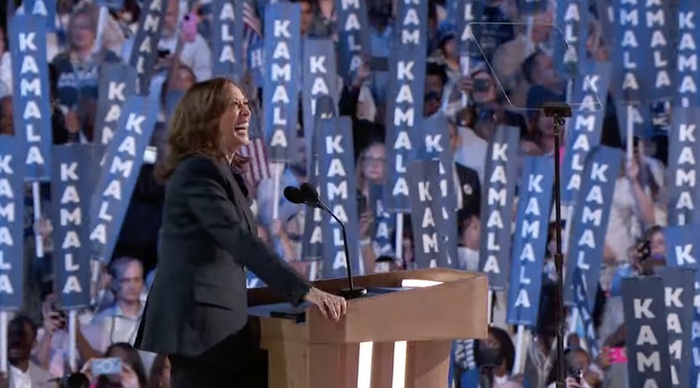
The Democratic presidential race has been a whirlwind since Joe Biden withdrew from it on July 21. And now Kamala Harris and Tim Walz are running for President and Vice President of the United States with a re-invigorated Democratic party supporting them. It’s time for each of us to examine who we are, what we believe in, and which presidential candidate aligns with our values.
I’ve been reading Kamala Harris’ memoir The Truth We Hold, an American Journey, which was published in 2019. For those who say they don’t know her and what she believes in, I recommend you read it. She describes how her mother, a scientist born in India, juggled her work schedule with care for her two young daughters after her divorce and how their close-knit community helped.
Harris became a lawyer so she could serve the people, and her political career recap shows us how she did that. Her faith is deep, her desire to defend human rights is genuine, her voice is true. One story I found particularly amazing is how she fought against big banks during the housing crisis of 2008/2009, inflamed by how Californians were losing their homes, some of whom were up-to-date on their mortgage payments–she didn’t let anyone or anything stop her. I like this review of her book that I came across in The Conversation.
As for her policies (“what are her policies?” some people are asking), as vice president, she was not able to formulate policy, but she can do that now. She laid out some of her ideas during her DNC acceptance speech but things will evolve over the next couple months. I intend to follow the updates in reliable news sources over the next two months to know where she stands on issues and how she might respond if she’s elected president. She will certainly advocate for human rights, women’s rights, freedom of religion, the environment, tolerance, and justice. Immigration is a big concern for her; Tyche Hendricks wrote for NPR that “Longtime political observers say her experience as the daughter of immigrants has intertwined with her career as a prosecutor to form a pattern: pro-immigration but tough in enforcing the law.”
It’s been almost eight years since the Women’s March, the worldwide protest on January 21, 2017, which took place the day after the inauguration of Donald Trump, prompted by his misogynistic policy positions and rhetoric. Hillary Clinton won the popular vote in the 2016 election — I love the political cartoon that’s been circulating which shows Hillary and Kamala standing at the beginning of the campaign path and Hillary saying she made the path for Kamala. I also like the cat lady T-shirts that have begun showing up in response to JD Vance’s 2021 statement that the United States is being run by Democrats, corporate oligarchs and “a bunch of childless cat ladies who are miserable at their own lives and the choices that they’ve made and so they want to make the rest of the country miserable, too.”
During the last couple of weeks, I’m leaning into the importance of Kamala Harris being a woman candidate for president. I think women are good leaders. Women like Michelle Obama, Nancy Pelosi, and Elizabeth Warren stand out because they stand up for what they believe in. They put their hearts into their rhetoric. They’re fighters. Did you know that there are 150 women in the U.S. Congress, according to USA Today? This year, we have another opportunity to choose a woman for president, and if she wins, it will be historic, and the climax to the story of women’s political history in the US.
It’s been just over 100 years since women were given the right to vote. On its website, the League of Women Voters’ position statement is “We believe in the power of women to create a more perfect democracy. That’s been our vision since 1920, when the League of Women Voters was founded by leaders of the women’s suffrage movement. For 100 years, we have been a nonpartisan, activist, grassroots organization that believes voters should play a critical role in democracy.” The website is full of inspiring information showing their commitment to voting rights, women’s rights, voter accessibility, and the democratic process. The organization’s most recent initiatives have been VOTE411 nonpartisan resources for the voting public and today, VOTE411 provides both general and state-specific nonpartisan resources to the voting public and People-Powered Fair Maps.* I plan to join the League of Women Voters so I’m informed and so I can work with other women to protect voters’ rights. (You too can join the LWV of Greater Cleveland here.)
I also signed up to volunteer for my political party and for the Sierra Club once again. Tim Walz said, “we can sleep when we’re dead,” which made me laugh when he said it. It is our call to action. Bottom line: the most important thing I can do, and that you can do, is to vote.
*Fair maps will be on the Ohio ballot this November as Issue 1: Citizens Not Politicians. It replaces the panel of elected politicians which disregarded the rules of fair map drawing written into the Ohio constitution by voters with a nonpartisan commission of carefully chosen citizens, representing both major parties and neither, who will be more likely to follow the guidelines since their own political position isn’t on the line.